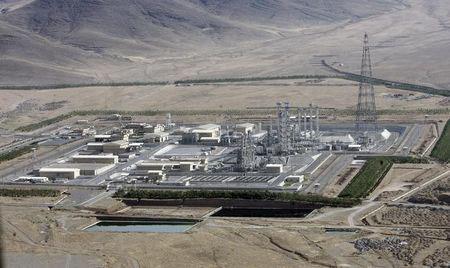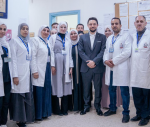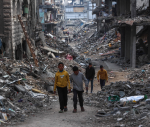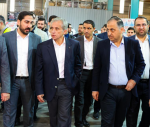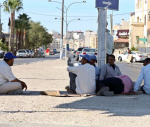You are here
Iran’s supreme leader calls for more nuclear enrichment capacity
By Reuters - Jul 08,2014 - Last updated at Jul 08,2014
DUBAI/VIENNA — Supreme Leader Ayatollah Ali Khamenei said Iran would need to significantly increase its uranium enrichment capacity, highlighting a gap in positions between Tehran and world powers as they hold talks aimed at clinching a nuclear accord.
Iran and six major powers — the United States, Russia, France, Germany, China and Britain — have less than two weeks to bridge wide differences on the future scope of Iran’s enrichment programme and other issues if they are to meet a self-imposed July 20 deadline for a deal.
They resumed talks in Vienna last week and their negotiators continued meetings in the Austrian capital on Tuesday, but there was no immediate sign of any substantive progress.
French Foreign Minister Laurent Fabius said in Paris that none of the major outstanding issues had been agreed and that the United States wanted foreign ministers to join the negotiations.
Iran’s capacity to refine uranium lies at the centre of the nuclear stalemate and is seen as the hardest issue to resolve.
Iran insists it needs to expand its capacity to refine uranium to fuel a planned network of atomic energy plants.
The powers say Tehran must sharply reduce that capacity to prevent the country being able to quickly produce a nuclear bomb using uranium enriched to a far higher degree.
“Their aim is that we accept a capacity of 10,000 separative work units (SWUs), which is equivalent to 10,000 centrifuges of the older type that we already have. Our officials say we need 190,000 SWU. Perhaps this is not a need this year or in two years or five years, but this is the country’s absolute need,” Khamenei said in a statement published late on Monday.
An SWU is a measurement of the effort necessary for the separation of isotopes of uranium. Western experts say Iran’s current centrifuges have a very low enrichment capacity compared with the most modern technology in the world. The Islamic Republic says it is developing new, more efficient models.
Iran says its programme is for civilian purposes such as electricity generation and denies having any ambitions to build a nuclear weapon.
Ending the decade-long dispute with Iran is seen as central to defusing tensions and averting the danger of a major Middle East war.
A Western diplomat made clear the uphill task negotiations face if they are to hammer out an agreement: “We’re still far from a deal...[However] the deadline is July 20 and that’s what we’re working towards.”
Iran expert Ali Vaez said the negotiations were now at a precarious stage. “This has once again turned into a contest of wills,” Vaez, of the International Crisis Group, said.
Hardliners
Last week, other Western diplomats said Iran had reduced demands for the size of its future nuclear enrichment programme in the negotiations, although Western governments were urging Tehran to compromise further. They did not give details.
But Mark Fitzpatrick, director of the non-proliferation programme at the International Institute for Strategic Studies (IISS) think tank, said Khamenei’s statement “confirms what I have suspected: That although Iranian negotiators have leeway on some issues, such as transparency and the time frame for lifting sanctions, they are not authorised to accept cutbacks to the enrichment programme”.
Iran now has more than 19,000 installed enrichment centrifuges, mostly old-generation IR-1 machines, with about 10,000 of them operating to increase the concentration of uranium’s fissile isotope U-235.
Mohammad Ali Shabani, a Tehran-based political analyst, said Khamenei’s statement was in line with what Iran’s negotiators have been saying for months in Vienna.
“The open timeline, however, allows enough flexibility for the two sides to come to consensus,” he said.
In defiance of Western pressure, Iran has expanded centrifuge numbers sharply over the last decade until it stopped doing that under a November 24 interim deal agreed with world powers in exchange for limited sanctions relief.
Iran wants an end to sanctions, which have stifled its economy and hindered oil exports. But Khamenei, ultimate arbiter on all major decisions in Iran, said the country “should plan for the future, supposing the enemy won’t ease on sanctions”.
Khamenei said the idea of shutting down the underground Fordow enrichment plant was “laughable”, his website said.
Related Articles
Iran will never slow down its nuclear research programme, its supreme leader said on Wednesday as negotiators from Tehran and six world powers struggled to narrow “significant gaps” that the United States warned might be insurmountable.
Iran is “busy redesigning” a planned research reactor to sharply cut its potential output of plutonium, a senior Iranian official said in comments that seemed to address a thorny issue in negotiations with big powers.
Iran's atomic agency chief insisted Sunday on Tehran's demands for increased uranium enrichment, days before the resumption of thorny talks with world powers in Geneva.



